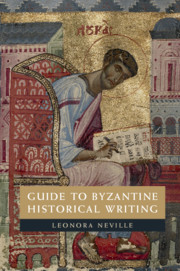Book contents
- Frontmatter
- Dedication
- Contents
- Acknowledgments
- Introduction
- Byzantine Historical Texts
- 1 Theophylakt Simokatta
- 2 Paschal Chronicle
- 3 George Synkellos
- 4 Chronicle of Theophanes
- 5 Patriarch Nikephoros
- 6 Scriptor Incertus de Leo V
- 7 Chronicle of 811
- 8 Megas Chronographos
- 9 George the Monk
- 10 Peter of Alexandria
- 11 Genesios
- 12 Theophanes Continuatus
- 13 Constantinian Excerpts
- 14 John Kaminiates
- 15 Symeon the Logothete
- 16 Leo the Deacon
- 17 Chronicle of Monemvasia
- 18 Chronicon Bruxellense
- 19 Psellos
- 20 John Xiphilinos
- 21 Michael Attaleiates
- 22 John Skylitzes and Scylitzes Continuatus
- 23 George Kedrenos
- 24 Nikephoros Bryennios
- 25 Anna Komnene
- 26 John Kinnamos
- 27 John Zonaras
- 28 Constantine Manasses
- 29 Michael Glykas
- 30 Eustathios of Thessaloniki
- 31 Joel
- 32 Niketas Choniates
- 33 George Akropolites
- 34 Theodore Skoutariotes
- 35 George Pachymeres
- 36 Nikephoros Gregoras
- 37 Ephraim
- 38 Constantine Akropolites the Grand Logothete
- 39 Chronicle of Morea
- 40 Nikephoros Kallistos Xanthopoulos
- 41 John VI Kantakouzenos
- 42 Michael Panaretos
- 43 Chronicle of Ioannina
- 44 Chronicle of Tocco
- 45 John Kananos
- 46 John Anagnostes
- 47 Leontios Machairas
- 48 Sylvester Syropoulos
- 49 Doukas
- 50 George Sphrantzes
- 51 Michael Kritovoulos
- 52 Laonikos Chalkokondyles
- Appendix A Time Periods Covered in the Histories
- Appendix B Timeline of Authors’ Lives
14 - John Kaminiates
from Byzantine Historical Texts
Published online by Cambridge University Press: 14 June 2018
- Frontmatter
- Dedication
- Contents
- Acknowledgments
- Introduction
- Byzantine Historical Texts
- 1 Theophylakt Simokatta
- 2 Paschal Chronicle
- 3 George Synkellos
- 4 Chronicle of Theophanes
- 5 Patriarch Nikephoros
- 6 Scriptor Incertus de Leo V
- 7 Chronicle of 811
- 8 Megas Chronographos
- 9 George the Monk
- 10 Peter of Alexandria
- 11 Genesios
- 12 Theophanes Continuatus
- 13 Constantinian Excerpts
- 14 John Kaminiates
- 15 Symeon the Logothete
- 16 Leo the Deacon
- 17 Chronicle of Monemvasia
- 18 Chronicon Bruxellense
- 19 Psellos
- 20 John Xiphilinos
- 21 Michael Attaleiates
- 22 John Skylitzes and Scylitzes Continuatus
- 23 George Kedrenos
- 24 Nikephoros Bryennios
- 25 Anna Komnene
- 26 John Kinnamos
- 27 John Zonaras
- 28 Constantine Manasses
- 29 Michael Glykas
- 30 Eustathios of Thessaloniki
- 31 Joel
- 32 Niketas Choniates
- 33 George Akropolites
- 34 Theodore Skoutariotes
- 35 George Pachymeres
- 36 Nikephoros Gregoras
- 37 Ephraim
- 38 Constantine Akropolites the Grand Logothete
- 39 Chronicle of Morea
- 40 Nikephoros Kallistos Xanthopoulos
- 41 John VI Kantakouzenos
- 42 Michael Panaretos
- 43 Chronicle of Ioannina
- 44 Chronicle of Tocco
- 45 John Kananos
- 46 John Anagnostes
- 47 Leontios Machairas
- 48 Sylvester Syropoulos
- 49 Doukas
- 50 George Sphrantzes
- 51 Michael Kritovoulos
- 52 Laonikos Chalkokondyles
- Appendix A Time Periods Covered in the Histories
- Appendix B Timeline of Authors’ Lives
Summary
The Capture of Thessaloniki is a text describing the sack of Thessaloniki by Leo of Tripoli in 904, surviving in one manuscript of the fifteenth century and several later ones. The text takes the form of a long letter ostensibly written by John Kaminiates to his friend, Gregory of Cappadocia, who asked for an account of the conquest of Thessaloniki and the subsequent treatment of the captives. John Kaminiates identifies himself as a priest of the imperial palace at Thessaloniki, holding the ecclesiastical dignity of kouboukleisios. He describes his father as an exarch of Greece.
The text does not conform to many of the conventions of Byzantine historical writing. It is framed, in its opening and closing, as a letter responding to a friend's request for information. Within the letter's frame, the text includes an encomium to Thessaloniki, a lament on the sins of citizens that provoked misfortune, and first- person descriptions of the attack on the city, the enslavement of much of the population, the travails of the prisoners on the voyage to Crete, and their subsequent dispersal. In narrating personal experiences of deep horror, the text does not conform to the dispassionate narration normal for classicizing history.
Alexander Kazhdan argued, largely on the basis of perceived anachronisms, that the text was a fifteenth- century composition masquerading as a tenthcentury text, written in response to the Ottoman siege of Thessaloniki in 1430, and questioned the historicity of Leo of Tripoli's attack. Other scholars think that the extant text is a reworked or modified version of a tenth- century original. Ioannis Tsaras argued for a tenth- century time of composition. David Frendo set the text in a tenth- century religious and literary milieu and undercut a number of Kazhdan's arguments from anachronism. Paolo Odorico offers additional arguments for accepting a tenth century date, pointing out the lack of sufficient motivation for a forgery, and explaining how Kaminates's text fits within tenth- century culture and politics.
- Type
- Chapter
- Information
- Guide to Byzantine Historical Writing , pp. 114 - 117Publisher: Cambridge University PressPrint publication year: 2018



